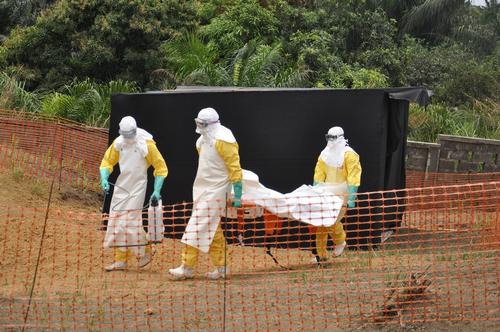You are here
Global health leaders ask G7 for post-Ebola rapid response unit
Primary tabs
(Two stories. Scroll down.)
REUTERS by Kate Kelland June 5, 2015
LONDON -- Global health leaders will ask G7 leaders this weekend to back the creation of a specialist rapid response unit to tackle outbreaks of infectious killer diseases.
 The corpse of a patient who passed away is given back to the family for funerals after being decontaminated by the MSF teams. It was washed with chlorine solution and put it in a hermetic bag also disinfected to leave the high risk area.
The corpse of a patient who passed away is given back to the family for funerals after being decontaminated by the MSF teams. It was washed with chlorine solution and put it in a hermetic bag also disinfected to leave the high risk area.
The move reflects how the World Health Organization in particular was caught unprepared last year by Ebola, which spread through three West African countries, has killed 11,000 people, and will not be stamped out before the end of this year.
Jeremy Farrar, director of the Wellcome Trust global health charity, said the unit should come under the WHO, but be free of bureaucracy and able to act independently "in days" when a potentially fatal epidemic begins...
The specialists, including Peter Piot, director of the London School of Hygiene and Tropical Medicine and a co-discoverer of the Ebola virus, foresee a rapid response unit of around 100 people working within the WHO in Geneva, able to call on a reserve of up to 10,000 scientists worldwide as necessary..
Read complete story.
http://www.reuters.com/article/2015/06/05/us-health-g7-global-idUSKBN0OL18E20150605
G7: The world is no better prepared today than a year ago to respond to Ebola
Médecins Sans Frontières June 3, 2015
Berlin – The global health system remains unprepared for mass disease epidemics warns the international humanitarian aid organisation Médecins Sans Frontières (MSF) today. MSF urges the leaders of the G7 countries at this weekend’s G7 summit in Elmau, Germany to commit to developing an efficient emergency response system against epidemics and international health crises, following the devastating Ebola outbreak in West Africa. The Ebola outbreak also underlines the real need to urgently fund the development of drugs and diagnostics for neglected diseases and to ensure access to existing medicines for patients in developing countries.
“If a global pandemic were to strike tomorrow, there is still no well-resourced, coordinated international response in place to kick in. The G7 leaders must recognise this gaping hole in our global health system and take concrete action to address it, or risk losing thousands of more lives in the next major epidemic,” says Dr. Joanne Liu, MSF International President. “There is a real danger of going back to business as usual: no major hospital would shut down the ER unit to only focus on general practice – both are needed for the world’s patients.”
Read complete statement.
http://www.msf.org/article/g7-world-no-better-prepared-today-year-ago-respond-ebola



Recent Comments